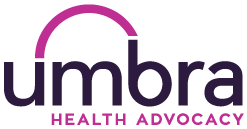Medicare Advocate FAQs

Umbra will handle all of the patient billing. All Advocates and Supervising Providers must provide clear, accurate and complete documentation. We have built our systems with simplicity and efficiency in mind to make this as seamless as possible for you.
Patient advocates provide a variety of services and specialize in different health problems and patient populations. There is a patient advocate who is an expert in just about every healthcare problem out there.
Advocates will submit timesheets within 5 days of delivering services.
At the month’s end, Umbra will process payment for the prior month’s approved timesheets within 30 days.
Timesheet format and manner will be specified by Umbra, to include dates of service, patient identifiers, start and end times, and brief activity descriptions.
All work you do with the patient, or on behalf of fulfilling the patient’s needs, as it relates to what is covered under PIN and CHI services can be billed for, provided there is clear documentation and the service is legitimate.
Activities like non-patient admin work, travel, general education and training and non-patient related emails would not be billable.
We understand that CMS rates do not match most private-pay rates, and do not meet many advocates’ needs or expectations. We recognize that this offering is not for everyone.
There are advocates for whom Medicare reimbursement represents an opportunity to get paid for otherwise pro bono cases, to fill gaps in their schedule, or to have access to clients they do not personally have to find and engage. It is important to us that we provide opportunities for advocates with these perspectives.
There are also other roles for licensed MDs, NPs and PAs, like conducting initiating visits and assessments to determine patient eligibility for PIN/CHI services and serving as the Supervising Provider to oversee ongoing services, when patients are deemed eligible.
If you hold an active license in one of those categories, and might be interested in serving in that capacity, I am happy to tell you more about it.
Payment will be made from Umbra to you as a 1099 contractor. As you are an independent contractor in this arrangement, we will not withhold social security or taxes.
Specific codes will vary based on the services provided and the CMS rules that apply. The following table shows the set of codes we will most likely draw from.
|
Social Determinants of Health Assessments |
||
|
G0136 - One stand-alone SDOH risk assessment performed no more often than every 6 months, lasting 5-15 minutes |
||
|
Principal Illness Navigation |
||
|
G0023 - 60 minutes/calendar month |
||
|
G0024 - Additional 30 minutes/calendar month |
||
|
G0140 - 60 minutes/calendar month (Peer Support) |
||
|
G0146 - Additional 30 minutes/calendar month (Peer Support) |
||
|
Community Health Integration |
||
|
G0019 - First 60 minutes |
||
|
G0022 - Additional 30 minutes after initial 60 |
For PIN services, beneficiaries must meet the following criteria:
- Patient must have 1 serious, high-risk condition that is expected to last at least 3 months and that places the patient at significant risk of
- Hospitalization
- Nursing home placement
- Acute exacerbation or decompensation
- Functional decline or death
- For the codes specific to peer support, the criteria includes 1 serious, high-risk behavioral health condition that is expected to last at least 3 months and places the patient at significant risk of hospitalization, etc. (list above)
- A condition that requires development, monitoring, or revision of a disease-specific care plan and may require adjustment in the medication or treatment regimen, or substantial assistance from a caregiver
- Billing provider must initiate PIN services during an initiating visit to address a serious, high-risk health condition
For CHI services, beneficiaries must meet the following criteria:
- Billing Provider must identify that the patient has unmet Social Determinants of Health (SDOH) needs that significantly limit the provider’s ability to diagnose or treat the patient.
- Billing Provider must conduct an initiating visit and an assessment to determine beneficiary eligibility.
- Patient must consent to receiving CHI services.
A Supervising Provider is responsible for overseeing the patient’s care and ensuring compliance with CMS standards. The Supervising Provider conducts an initiating visit and determines a patient’s eligibility for PIN or CHI services. If the patient is eligible, the Supervising Provider conducts “General Supervision” for the services. “General Supervision” means providing overall direction and control, periodically reviewing documentation and confirming that billed activities match the patient’s needs and CMS requirements, and reviewing and adjusting care plans, as needed. Provider presence is not required during the performance of the Services.
An Advocate, on the other hand, provides PIN or CHI services, assisting the patient with navigating healthcare services and creating an action plan. While Advocates can provide direct support, Supervising Providers conducts oversight and the services are billed under their NPI.
These services will be provided virtually.
